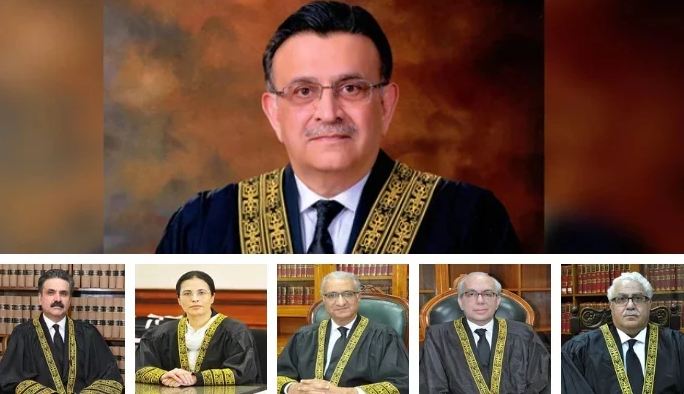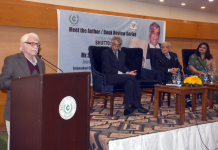ISLAMABAD: Chief Justice of Pakistan (CJP) Umar Ata Bandial Tuesday turned down the government’s request to establish a full court to hear the multiple petitions challenging the trial of civilians in military courts, terming the demand “impossible”.
The CJP’s remarks came during a hearing of the petitions in the apex court by a six-member bench that also included Justice Ijazul Ahsan, Justice Yahya Afridi, Justice Munib Akhtar, Justice Mazahir Ali Akbar Naqvi, and Justice Ayesha A Malik.
In response to the government’s request, made through Attorney General for Pakistan (AGP) Mansoor Usman Awan, the CJP said: “When the bench was first formed, all the judges were consulted and the bench was formed based on the available judges.”
“It is impossible to make a full court at this time,” he said, adding that doing so is impossible on a technical basis.
“Three judges excused themselves from hearing the case; some judges are not in the country,” he said.
He further said that two more judges excused themselves on the first day of the hearing.
“We were surprised when the government came to the second hearing and objected to a judge.
“Justice Mansoor excused himself from hearing the case.” The CJP remarked that the bench had shrunk from nine to six.
“No judge has [any] personal interest in a case of public interest,” he remarked.
Earlier, the AGP had referred to Justice Afridi’s additional note in the June 23 order and said that the justice, too, believed a full court should hear this matter.
“This is the first case of its kind related to the Army Act,” he said, in response to which Justice Ayesha said: “You objected to one member in the last hearing, how are you requesting to make a full court now?”
She further slammed the AGP’s request saying, “When the case started, you did not object to anyone.
“Then the government objected to one judge, and now, it is requesting to reconstitute the bench.
“I am unable to understand your position.”
However, the CJP then observed that while the bench would consult among itself, it was impossible at the moment.
‘Glad people in custody allowed to meet families’
During the hearing, the CJP also expressed his satisfaction that those in custody were allowed to meet their families — a point he had stressed on numerous times in previous hearings.
“Glad that people in military custody were allowed to meet their families,” he said, adding that everyone in the country was worried about how the civilians will be subjected to the strict laws of the Army Act.
“The Army Act is a strict law,” he remarked, adding that Latif Khosa had said in the beginning that the cases should be tried in the Anti-Terrorism Court.
“Everyone admits that the events of May 9 were of a serious nature; however, civilians cannot be subjected to any trial against the Constitution,” he said.
He then reiterated that as long as the case is under hearing, all the facilities should be given to the detained persons.
Defence Ministry raises objections on 3 judges
The defence ministry’s lawyer, Irfan Qadir, then objected to three judges of the six-member larger bench.
“I request that Chief Justice Bandial and other two senior judges do not hear the case,” he said.
At this the CJP responded: “Give arguments in your turn, don’t give arguments in bits.”
Qadir replied: “Later you will say why the objection was not raised earlier.”
‘Can army summon civilians?’
At the start of the hearing, Advocate Zuberi presented his arguments and drew the court’s attention to previous decisions of the apex court.
He maintained that civilians could not be tried under the Army Act, citing a judgment of Justice Ajmal Mian, referred to Section 8(2) of the Constitution.
“In the decision, it was said that the trial under the Army Act can only be for the personnel of the forces,” he said.
He added that the 21st Constitutional Amendment case decision states that a law that suspends fundamental rights cannot be applied and that Justice Faez Isa had previously declared military courts are not constitutional courts for trials of civilians.
He further contended that there was the issue of calling forces under Article 245 was also mentioned in his petition.
In the FB Ali case, the court said that if civilians are found to be involved in defence matters, they can be tried under the Army Act.
The fundamental point is how the relationship of the accused will be established with the allegations, he said.
“Will the accused be allowed to file a constitutional petition against the decision of the military courts?” he asked.
At this, Justice Afridi asked if Zuberi meant to say that trials of civilians should be done in civil courts first.
“If charged in civil courts, can the matter be sent to military courts?” he inquired.
Zuberi responded that the trial should definitely be held in civil courts first, adding that it was not known whether the arrests had been framed in the military courts or not.
Justice Akhtar then repeated his colleague’s question and asked: “If the charge is framed against a civilian, can the army take him into custody?
Can the army summon civilians for investigation?”
Zuberi responded that military trials of civilians in the custody of the forces cannot be done without a constitutional amendment.
The CJP inquired what would happen if ordinary citizens were found to be working against the national defence.
“Even if civilians are found to be involved against national security or defence, a constitutional amendment is mandatory for military trial,” Zuberi replied.
He further contended that after May 9, the Official Secrets Act was applied to some people and not to others, adding that trials in military courts were not conducted before judicial memebers but those of the executive.
When asked who decided at what stage the charge frame and the trial would be under the Army Act, he replied: “Only the civil court can decide whether the military act is applicable or not.”
The petitions
Following the arrests made in connection with the violent riots that erupted across the country on May 9, the government announced its decision to hold military court trials of those found guilty of damaging and attacking military instalments — a move both the government and the army considered a low blow.
In light of this decision, PTI Chairman Imran Khan, former chief justice Jawwad S Khawaja, legal expert Aitzaz Ahsan, and five civil society members, including Piler Executive Director Karamat Ali, requested the apex court to declare the military trials “unconstitutional”.
In this petition filed through his lawyer, the former CJP pleaded that Section 2(1)(d)(i) and (ii) of the Pakistan Army Act were inconsistent with the fundamental rights granted by the Constitution and should be struck down.
Moreover, five members of civil society from different cities — represented by Faisal Siddiqi — appealed to the apex court to declare illegal the trial of civilians in the military courts.
Similarly, Ahsan’s petition challenged the government’s decision to try civilians in military courts.

















